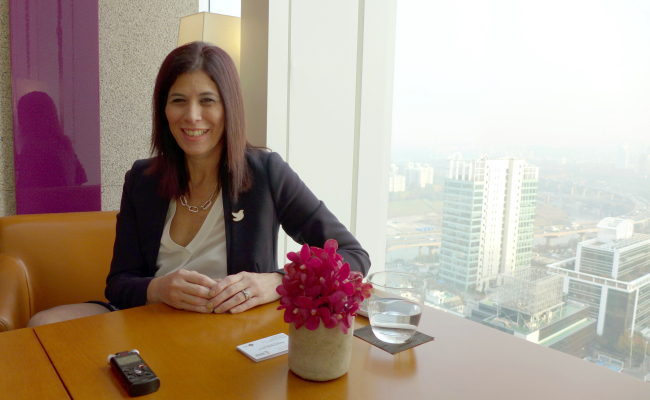Colombia is an emerging country in South America that needs expertise in upgrading its inexpedient infrastructures.
The country registered a 4.6 percent economic growth last year, and to tread close to its target of 3.3 percent for this year and beyond, it requires massive investments in infrastructure and residential construction.
For the period 2015 to 2035, the administration of President Juan Manuel Santos has unveiled an ambitious Intermodal Transport Master Plan, aimed at boosting nationwide connectivity through new ports, airports, railways, subways and roads.
Natalia Abello Vives, Colombia’s transport minister, visited Korea last week to solicit Korean investment in her country. She met Korea’s Transport Minister Yoo Il-ho, and participated in the 25th World Road Congress Seoul from Nov. 2-6.
 |
| Colombian Transport Minister Natalia Abello Vives. Joel Lee/The Korea Herald |
“We want to borrow Korea’s skills in building our airports, subways, railroads and intelligent transportation systems,” Abello told The Korea Herald Wednesday. “Our government has two major initiatives ― the El Dorado International Airport in capital Bogota and the Bogota Metro.”
The airport, one of the world’s 50 busiest and Colombia’s most overloaded, will have a new terminal by next year, and the Bogota subway will soon open an international bidding to materialize itself by 2021.
As part of public-private partnerships, 19 public projects have been assigned to companies through public tenders, with 2 to 3 slated for next year. Abello pointed out that ample space existed for foreign capital in the private ventures.
Since President Santos took office in 2010, over 4 million people have been lifted out of extreme poverty, to enjoy the fruits of dwelling, medical attention, education and employment, according to the minister.
“Now, our government is engaging in infrastructure projects to create 400,000 new jobs and stimulate the economy for the next five years,” she stressed. “Infrastructure development can provide wealth and welfare to the people, make them economically productive and foster society-wide consensus on the country moving forward.”
Santos has claimed that infrastructure building, alongside peace ― few steps away from a reality after long-hauled negotiations with the terrorist group FARC ― would add to the economy’s growth by 2 percent from 2018.
In line with the long-term master plan, Bogota said it would raise annual infrastructure budget to 3 percent of gross domestic product, up from the present 1.5 percent.
Abello underscored that the public works schemes strengthened the democratic procedures by activating linkages across the territory and participation across the society. “Citizens define their local infrastructural needs, and the central authorities regularly visit the 32 territorial departments to sync grassroots demands with the national plans.”
The long-stretched deal with FARC in Havana, Cuba, bordering three years, has borne accords on rural development, political participation and termination of narco-trafficking. Disarming the 6,000-strong guerillas, the largest insurgency in Latin America, and enforcing justice on the murderers, kidnappers and extortionists, currently hang in the balance, analysts say.
“With the international community’s assistance, including Korea,” Abello noted, “we hope to achieve peace and emulate your impressive development, which has taken place after the Korean War (1950-53).”
The minister highlighted that the two countries’ bilateral free trade agreement was pending a constitutional approval in Colombia, indicating optimism for the deal to kick into effect next year.
During President Park Geun-hye’s tour of South America in May, two memorandums of understanding were signed between the respective ministries: the two countries agreed to implement master plans for a port on Colombia’s Pacific Coast and railways across the country.
In recent years, Bogota has introduced the Bus-Rapid-Transit system, following Brazil’s environment-friendly city of Curitiba, in an effort to cut down traffic and carbon emissions. The Transport Ministry also supports alternative mobility by investing in bicycle infrastructures and programs.
By Joel Lee (joel@heraldcorp.com)

